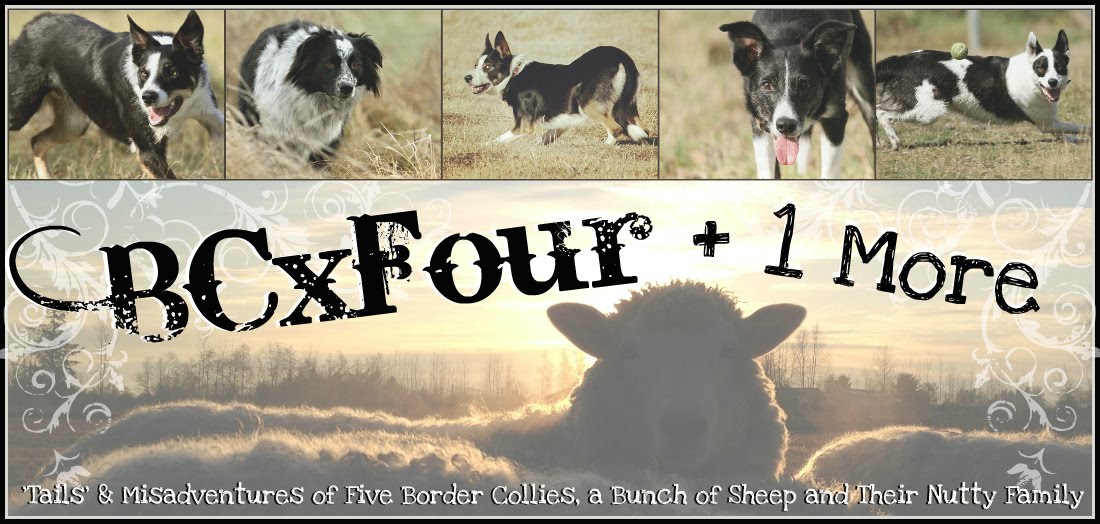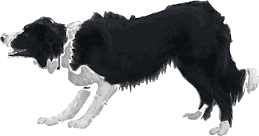I have had many hours to reflect on a multitude of things before and after working my dogs. The trial this last weekend at the Western Idaho Fair also provided me with 8 times at the post to work on issues my ego has generated in the past. I am happy to say I retired 4 times to walk away and help my dog. I am proud of the work my dogs did - and fully accepting that the problems they had on the field were directly resulting in my lack of communication and timing of corrections in training.
We have been focusing on driving. In the time being the outrun/lift and fetch have gone haywire. Someday soon I hope it all comes back together.
I am often struck with 'ah ha' moments. Infused with a sudden push of inspiration I believe has solved all my problems and feel on top of the world. Then something else pops up that leaves me drooling in the corner wondering why I ever thought this hobby would be enjoyable? Most of the time I think it is just full of new and interesting ways to make an ass out of yourself.
The "Nine Secrets of Perfect Horsemanship" by Don Blazer has become my training bible of sorts. Through my work with the dogs I have learned more about myself than I thought possible. Looking back I wish I could have learned how to handle a dog before I had children.
So much of what I do is driven by my ego. I loathe to admit it.
A couple passages in the book that have struck me:
Pg 53 "If you are training from the heart, you will never go wrong. However, if you are training from the ego, demanding control over the horse (dog) instead of a partnership, the stresses (on the dog) will almost always be unnecessary. Such stresses are usually the result of the trainers attempt to appear dominant in the eyes of others.
Pg 54 " When you are guided by your ego, you lose your temper, are cruel and inhumane. You are out of control and inflict pain and physical and mental injury to the animal. When you examine our actions later under cooler conditions, they will always appear unnecessary and stupid.
Pg 54 & 55 "Can your ego take the criticism of how you treated your horse (dog). If it can, you are maturing and gaining control of yourself. If it cannot take the truth, you have lost self control and are ruled by your ego. The standard by which you judge your actions is: Was the action truly in the best interest of the horse (dog) If the answer is an honest no then your action was ego directed.
If my head is controlled by my ego - the energy I am projecting is teetering on the verge of anger - because I feel the need to CONTROL rather than PARTNER with the dog.
My worst moments of anger have come about from frustration I felt when things did not go as I planned or envisioned. For example: my behavior at Athena SDT last month. Because my ego was ruling the roost and I felt a loss of control over my dog I became angry....instead of trying to work with my dog, partner with her and give her the right information she needed to please me...I started to yell, smack the pen with my stick and in general make a complete ass out of myself.
Was that in the best interest of my dog? Hell no.
Looking back on it I felt deep shame. I use the shame as a catalyst to improve - the improvement needs to come from a reflection on what motivates that behavior when I feel out of control.
The key, for me, is to let go of the control. I am not controlling anything. I cannot control my dog when she is 200 yards away from me. The reality is she wants to please me and I need to provide the correct and accurate communication to her so she is able to do that.
A simple "NO" can work wonders.
NO, means NO. Not a screaming yelling fit of rage. A simple NO to block an unwanted behavior. Make the right thing easy, the wrong thing difficult.
Dianne was explaining this to me again today - It is all about how you project your energy. You can say NO in a loud boisterous angry voice - really bellow it out there. What kind of energy are you projecting?
Do I need to smack my dog in the top of her head when she refuses to lie down? NO. All I have to do is block her access to the sheep, say NO and make the wrong choice hard. The easy choice is to lie down.
Do I need to run screaming up the field, waving my stick and shouting profanities at her when she busts up the sheep? NO. I can walk calmly up the field, block her access to the sheep, say a few stern words to make the wrong choice hard and the right choice easy.
When you say NO in a firm even tone, you send the same message to the dog, but retain a calm atmosphere that opens the dog's mind and allows learning - rather than fear. Mostly it allows me to stay in a positive head space - enabling me to learn as well.
My dog wants to please me. Not defy me. I need to provide the information to them on HOW to please me. Be simple, clear & consistent.
Pg 52 The THIRD GUIDELINE to perfection in horsemanship is “NO CRITICISM.” Begin with no criticism of yourself. That doesn’t mean you refuse to recognize your errors or your ego directed behavior.
Pg 53. No criticism means no criticism of your horse (dog). No criticism means not making disparaging remarks about competitors, trainers, horses (dogs) or judges.
To criticize others is to degrade yourself and to use your energy in a wasteful and unproductive way.
The THIRD SECRET is: PRACTICE NON-JUDGMENT It is not for you to judge whether any thought or action is wrong or right is good or bad, is joyous or sad. Each thing simply “is” You must try to see it as that and nothing more.
I do not feel I ever need to strike my dog. I am only saying this does not work for me. It does not work for my dogs. I will only train with people who do not advocate striking the dog as corrections. It does not work with children, in my opinion it does not work with dogs. MY DOGS.
That said, while I strongly disagree with the method - I can accept physical corrections can be used correctly. Many of the 'Big Hats' have been training that way for years - and it works for them. Cessation of a particular behavior is rewarded by the swift end of punishment. If the dog is in the process of learning a particular behavior, then the discipline should be brief followed by an attempt to teach the desired behavior. I believe the truly successful handlers who use physical corrections do it correctly as a tool to facilitate learning - never in anger.
The only flaw I see in this beyond the obvious aspect of abuse: doesn't the over use of a physical correction only bring about learned helplessness? Domination rather than punishment? Why not ask for a partnership?
Never in a million years can I hit this face
She ONLY wants to please me.
The only thing I can do is what feels right for me and continue learning all I can. Nothing more, nothing less.









